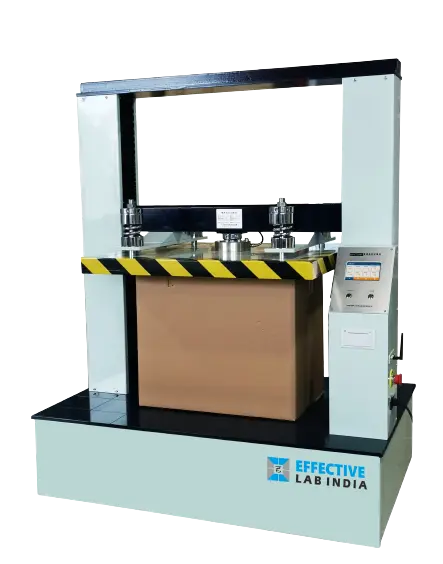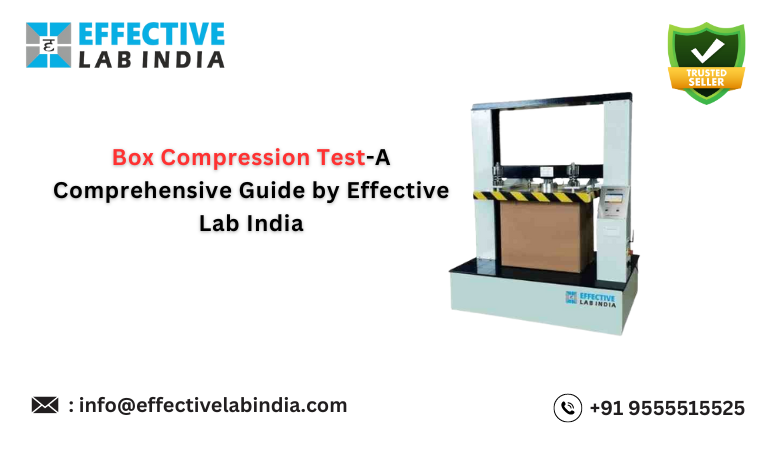Making sure your boxes can survive the stresses of shipping and handling is essential in the world of packaging and logistics. Ever wonder how well packaging holds up under stress? In this case, the Box Compression Test is useful. To guarantee that boxes can survive the rigours of handling and transit, this test is essential to the packaging business. However, what is the purpose of a Box Compression Test and what makes it so important? This is where a machine called a box compression tester is useful.
An instrument used to measure the compressive strength of packing materials, including corrugated cardboard boxes, is called a box compression tester machine. To assess the longevity and functionality of boxes, it replicates the pressures that they would encounter during handling and transit.
An Overview of Efficient Lab India
One of the top brands in testing solutions, particularly in the packaging industry, is Effective Lab India. With years of experience, they offer excellent Box Compression Testing products that satisfy industry requirements.
Delivering highly accurate and trustworthy Box Compression Test results is Effective Lab India’s speciality. Their expert staff or machinery make sure your package meets every requirement.

What is the Box Compression Test?
A standard procedure called the Box Compression Test is used for determining a box’s or corrugated container’s resistance to compressive pressures. This test helps in determining how effectively a box can withstand pressure and layering while being transported and stored.
Consider a situation in which packages are stacking up in a warehouse. Insufficient strength in the boxes might cause them to collapse and harm the products inside. By ensuring that the boxes are capable of withstanding the stress, the Box Compression Test safeguards the products as well as the delivery procedure.
What is the Box Compression Test Formula?
To determine the strength of packaging materials, the “Box Compression Test formula” is essential. It aids in calculating the heaviest weight a box can support before collapse. In simple terms, the calculation involves determining the maximum force that a box may withstand, which is usually stated in pressure units like the kgf (kilogram-force).
How the Formula is Used
Using this formula, manufacturers can predict how well their packaging will perform under various conditions, ensuring that products are well-protected during transit and storage.
Box Compression Test Standard
The ASTM D642 and ISO 12048 industrial standards, among others, are met by the Box Compression Test. These standards include instructions on how the test should be performed and what requirements must be satisfied.
Observance and Accreditation
To certify that the tested packaging satisfies the necessary quality requirements, Effective Lab India makes sure that all of their testing processes adhere to these criteria.
Box Compression Test kgf
Definition of KGF (Kilogram-force)
Kgf, or kilogram-force, is a unit of force used in the Box Compression Test. It represents the force exerted by a kilogram of mass under standard gravity.
How kgf is Measured and Interpreted
In the test, kgf measurements help determine the force a box can handle before failure. Understanding these measurements allows manufacturers to make informed decisions about their packaging designs.
Procedure for the Box Compression Test
Systematic Process
Sample Preparation: The tested box will be put together using specified measurements and specifications.
Setup: A compression testing equipment is used to put the box.
Compression: Until the box collapses, the machine provides pressure.
Measurement: The greatest force used before it fails is recorded.
Why Choose Effective Lab India?
Precise testing techniques and cutting-edge technology identify Effective Lab India. With the help of their team of professionals, every test is carried out properly and provides accurate results.
Customer Testimonials
Effective Lab India has received great marks from several clients for their expertise and the grade of their testing instruments, highlighting their contribution to increased package durability.
Applications of Box Compression Testing
Industries That Benefit from the Test
Box Compression Testing is beneficial to several businesses, including manufacturing, retail, and logistics. It guarantees that goods are tough enough to survive the challenges of transportation and are packaged securely.
Knowing how various packaging materials behave under compression may help businesses improve their packaging methods for everything from electronics to food packaging.
Test Sample Data for the Box Compression Test:
Type of Box: Corrugated Cardboard with Double Walls
- Dimensions: 300 mm x 300 mm x 300 mm
- Material: 200 gsm Kraft Paper
Test Conditions:
Temperature: 23°C (Room Temperature)
Humidity: 50%
Testing Machine:
Model: Effective Lab India Box Compression Tester
Capacity: 5000 kgf
Preparation of Test Procedure:
The box is prepared according to the standard dimensions.
The box is conditioned at 23°C and 50% relative humidity for 24 hours before testing.
Compression:
- The box is placed in the compression tester.
- Compression is applied at a rate of 12.7 mm/minute.
Measurement:
- Maximum Compression Force: 350 kgf
- Deformation at Maximum Force: 20 mm
Results:
- Box Compression Strength: 350 kgf
- Compression Failure Mode: Corner Crushing
- Pass/Fail Status: Pass (Based on the requirement of 300 kgf)
Analysis:
- The box showed indications of collapse after it took on the weight of 350 kgf of applied force. This suggests that the box can be used for packing applications that call for comparable strength requirements.
Conclusion
In conclusion, the most important phase in ensuring the strength of packing is the Box Compression Test. Manufacturers may ensure the durability of their packaging by using the trustworthy testing solutions offered by Effective Lab India. Comprehensive testing improves the requirements for overall operational efficiency as well as product protection.

